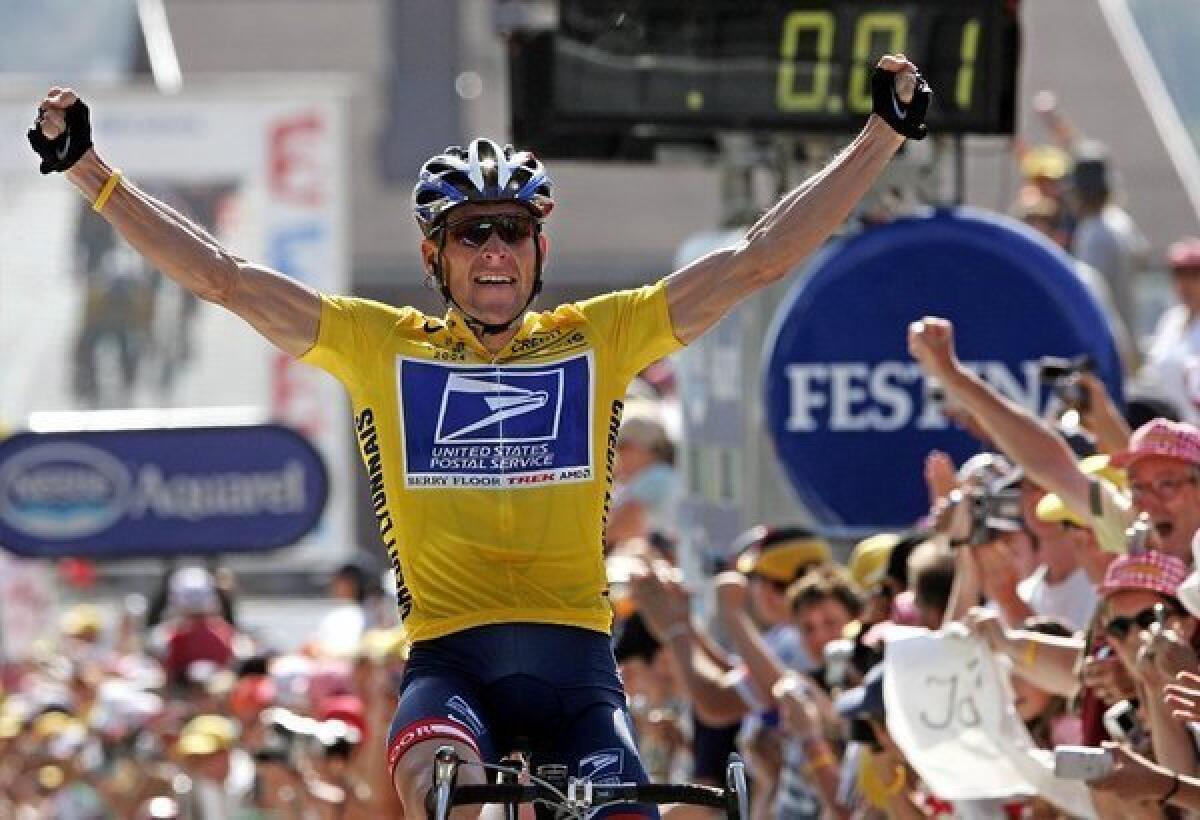Lance Armstrong and Americansā taste in heroes

What is it Lance Armstrong wants from us?
News reports are saying that the fallen hero of cycling and of cancer patients may be about to confess to doping over the course of his extraordinary cycling career.
I hope heās heard the adage about keeping your mouth shut and being thought a fool instead of opening it and removing all doubt.
PHOTOS: Lance Armstrong through the years
A confession would remove all doubt, but it couldnāt be a wink-and-nod confession just to get back into the cycling game, the charity game, the headlines. He couldnāt have his fingers metaphorically crossed. He has to be the repentant thief, not just the one who was only sorry that he was caught. Fans who defended and supported him already feel that theyāve been duped once; fool them twice ā you never get them back.
So what would Armstrong get out of confessing and confirming our widely held suspicions that would be worth an eternal asterisk?
Heās evidently been going through the Elizabeth Kubler-Ross stages of sports death: denial, anger, bargaining (which in Armstrongās case meant leveling lawsuits against his accusers. One British newspaper that reprinted doping accusations is now suing him back for the money it lost to him in a libel suit), depression and acceptance.
Acceptance ā a confession ā gives Armstrong nowhere to go but up. He might get back some semblance of a sports career from which he has been banned for life; he might get back some of the sort of endorsements he lost; he might restore repute to the charity he founded.
His chief accuser, the United States Anti-Doping Agency, would get a big credibility slam-dunk with its āI told you soā to skeptics and critics.
And if a confession doesnāt generate perjury charges because all of his āI didnāt do itā oaths, he could wind up back on the sunnier side of the headlines. Because donāt we already think the worst of him? And donāt we love a repentant sinner more than someone who never erred in the first place?
A confession would be a canny career move, and itās a testament to how much we love a good story that it might possibly work to his advantage. Lance Armstrongās story is at least as much about us, and where we look for heroes, as it is about him. And any confession would prove it.
It would make us ask ourselves, again, how well do we choose our heroes? What are their qualities? Strength of body? Of character? Why do we sometimes find our heroes among men and women who broke the rules, if not the law, to accomplish their heroics? And what lesson do our kids take away from a Lance Armstrong who could confess his way back into the sports fold, if not onto the front of a Wheaties box?
Itās the shadier iteration for Americansā love of reinvention, that curious combination of outlaw and penitent that we seem to love, the sinner who repents more than the virtuous soul who never strays from the path. Jim Morrison trumps Van Cliburn.
Our libertine side loves the wayward fellow, but our puritanical side loves him a lot more for getting caught and paying for the sins heās confessed. Itās just a better story, and weāre suckers for it. And it only works if the sinner is also a winner.
Baseball great Pete Rose, after years of denial, made a partial confession, evidently in hope of a rehabilitation that hasnāt come yet (unless you count a stint in the pro wrestling world) but may yet.
Michael Vickās public repentance for his repugnant dog-fighting practices has allowed him back into pro football, and heās become useful to the anti-animal cruelty movement.
As the sadder-but-wiser cyclist, Armstrong could restore himself to the public eye, if not necessarily its heart, as the poster boy against drugs in sports. If he could humble himself enough -- a big question for a big ego -- he might still be a fundraiser, and a product spokesman.
And that, like those seven Tour de France titles that were stripped from Armstrong, is a long shot -- although not as long a shot as we might tell ourselves we want it to be.
ALSO:
Humans: are we creeps or saints?
Paying the tab for federal disaster relief
Keeping hold of the worst job in Congress
More to Read
A cure for the common opinion
Get thought-provoking perspectives with our weekly newsletter.
You may occasionally receive promotional content from the Los Angeles Times.











